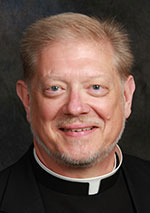That All May Be One / Fr. Rick Ginther
Let us honor what is true and good in other religions
 Last month, I wrote about the celebration of Passover (April 8-16). I noted as well the concurrent Christian celebration of Holy Week and the Great Three Days (April 5-12). As you read this, Passover has ended. The Easter season is unfolding until its conclusion on Pentecost (May 31).
Last month, I wrote about the celebration of Passover (April 8-16). I noted as well the concurrent Christian celebration of Holy Week and the Great Three Days (April 5-12). As you read this, Passover has ended. The Easter season is unfolding until its conclusion on Pentecost (May 31).
Quickly coming upon the heels of Passover and overlapping our Easter season are two other religious observances of major worldwide religions: Ramadan and Vesahk.
The Muslim month of Ramadan will commence on April 24 and extend to
May 23. This annual observance from dawn to sunset the entire month will witness Muslims refrain from eating, drinking, smoking and having sexual relations. They will also work hard to refrain from any sinful behavior such as lying, cursing, false speech and negative emotions like anger.
As I noted last year, these practices are to teach the true meaning of perseverance and tolerance. In addition, generous support of the poor marks this period. It is believed that the rewards of all Good Deeds (praying, giving charity) are increased during the month of Ramadan.
Ramadan concludes with Eid al-Fitr. This festival’s first day begins during the evening of Saturday, May 23, and ends during the evening of Sunday, May 24. Muslims are not permitted to fast on this day. The festival extends for three days. On these days, Muslims share in Eid prayers, charity, social gatherings, festive meals and gift-giving. Perhaps one of your Muslim friends will invite you to a festive meal!
Vesakh, or Vesak, is a major festival among Buddhists. It recalls the birth, enlightenment and death of Gautama Buddha (also known as Siddhartha), the founder of Buddhism. Tradition says that all three events happened on the same day of the calendar throughout his life. The festival is observed usually on a Sunday during the first full moon of May.
Buddhists live all over the world. Regionally, there are Buddhist temples, centers and monasteries in Indianapolis, Bloomington, Louisville, Cincinnati and Dayton. But the majority live in southeast Asia.
As one can imagine, how this variety of cultures observe Vesak varies. Yet, there are commonalities. Typically, Buddhists gather in their temples at the break of dawn on Vesak. While there, they meditate on all the religious precepts of Buddhism: embracing celibacy, speaking wisely, honoring life and showing generosity to their fellow citizens.
Over the three days of Vesak, offerings of candles and flowers are often made. These gifts show that life is fleeting. In many places, the people hang and give away flags of Buddha. The lighting of lanterns and releasing them into the sky is another common practice. Similarly, the setting free of caged birds takes place.
Other religious practices bring happiness to other people: the ceremonial washing of a Buddha statue, paying homage to Buddha and giving to the poor or underprivileged.
These practices, in part, reflect the great respect that Buddhism encourages its adherents to have for humanity and nature.
We Roman Catholics share this respect for life in nature. Pope Francis has named this a priority for us (“Laudato Si’, on Care for Our Common Home”). We ourselves have a day—on Sept. 1—when we are in solidarity with our Orthodox brothers and sisters in praying for creation.
We honor what is true and good in all religions. Perhaps our getting to know more about Buddhism can provide us a link to others who love what God has made.
(Father Rick Ginther is director of the archdiocesan Office of Ecumenism and Interreligious Affairs. He is also the pastor of Our Lady of Lourdes Parish, Indianapolis.) †
 Last month, I wrote about the celebration of Passover (April 8-16). I noted as well the concurrent Christian celebration of Holy Week and the Great Three Days (April 5-12). As you read this, Passover has ended. The Easter season is unfolding until its conclusion on Pentecost (May 31).
Last month, I wrote about the celebration of Passover (April 8-16). I noted as well the concurrent Christian celebration of Holy Week and the Great Three Days (April 5-12). As you read this, Passover has ended. The Easter season is unfolding until its conclusion on Pentecost (May 31).